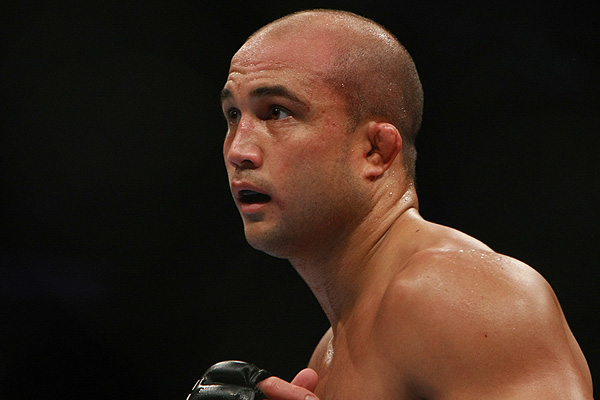May 24, 2008. Las Vegas. UFC 84. “Ill Will.”
It was the second and final time that MMA legends Tito Ortiz and B.J. Penn would appear on the same card.
Penn, the headliner of the night, was making his first lightweight title defense and looked amazing doing so. He took apart Sean Sherk, fulfilling the promise of the “Sean Sherk, you’re dead” proclamation he made in a post-fight interview in the Octagon. Penn, who had previously defeated Matt Hughes to claim gold at 170 pounds, now looked to be the unmatched champion at 155. Penn’s future looked incredibly bright. Ortiz found himself in a much different position. He was two fights into what would be a 1-8-1 stretch, the lone victory a somewhat surprising submission of Ryan Bader. Ortiz seemed to be trying to get his career back on track, but he was not the fighter he once was.
Penn was 29. Ortiz was 33. If anyone was to predict that night which of these fighters would go out on their own terms, with a high-profile victory against a high-profile opponent, chances are the guess would not have been Ortiz.
But let’s not get ahead of ourselves. These two men helped to build the UFC in different ways. Both popular, again in different ways. Penn was the hero. Ortiz, the anti-hero. Penn was the reluctant marketer, whereas Ortiz was the eager marketer. Penn had respect heaped on him from the very beginning. Ortiz never seemed to get what he thought he deserved. Penn was ever perceived as the underachiever. Ortiz stood as the picture of overachievement. Penn, who came from wealth, had resources at this disposal. Ortiz, ever the grinder, had to make his opportunities.
Penn’s career always seemed to hinge on his potential in the lightweight division. While he held his own at 170 pounds, 155 seemed to be his weight. After back-to-back losses at welterweight to Hughes and St-Pierre, Penn answered career questions with old nemesis and fellow The Ultimate Fighter coach Jens Pulver. He finished Pulver at 155, then topped Joe Stevenson and Diego Sanchez.
If 155 was his wife, then 170 was always his mistress. The division was always able to lure Penn with big-name, big-money fights. A rematch with GSP brought him back to welterweight first. Unable to defeat St-Pierre, he returned home to lightweight to impressive victories over Kenny Florian and the aforementioned Sanchez. His absence allowed a division he was once light years ahead of time to catch up. This was shown in the person of Frankie Edgar. Edgar took Penn’s belt and then defended it in the rematch. A fight with Matt Hughes beckoned “The Prodigy” back to welterweight, and the impressive fashion with which he won may have convinced him he belonged there. He did not. Beatings at the hands of Rory MacDonald and Nick Diaz showed Penn that a division he was once able to moonlight in now had no room for his skill set, which at this point was diminishing. His career ended with a revenge fight with Edgar where his game plan and skill set were not present, followed by a featherweight dance with Yair Rodriguez where he was just overmatched.
Ortiz’s career was different in the sense that he found a home at 205 pounds and was going to live or die with the results at that weight. Ortiz’s career became more about what the perception was that he couldn’t do, rather than what he could. The bar was lowered, which allowed Ortiz to surprise the public on several occasions in the back nine of his career. The fights that lowered the bar were the Chuck Liddell and Randy Couture fights. Liddell outclassed Ortiz on the feet, not once but twice, and Couture out-grappled and spanked his way to victory. After that, however, Ortiz rattled off some high-level victories. Yet, there was always an excuse to discount them. Patrick Cote wasn’t big enough. Vitor Belfort had lost it. Forrest Griffin wasn’t ready for that level. The Belfort and Griffin fights were split decisions. Ken Shamrock was past his prime.
Ortiz’s on-again/off-again relationship with both the UFC and more specifically the company’s president, Dana White, downplayed the victories, too. The next run of five fights resulted in four losses and a draw. The draw to Rashad Evans and the losses to Liddell a second time, Lyoto Machida, the aforementioned Griffin and, perhaps the one that lowered the bar to its lowest point, Matt Hamill. However, it was this fight that set the table for the surprise submission victory over Bader that bought Ortiz some more time on the roster. What spelled doom for Ortiz in the UFC was the next three fights, all losses, including rematches with Evans and Griffin that bookended a loss to Antonio Rogerio Nogueira.
Again the bar was low as Ortiz made his way to Bellator to take on middleweight champion Alexander Shlemenko. In another surprise submission, Ortiz found a choke in the first round and brought himself back to relevance. His career ended by splitting his last two fights. First, there was a first-round submission loss to Bellator titleholder Liam McGeary and then a first-round submission win over Chael Sonnen.
The irony of the careers of Penn and Ortiz coming to an end at a time when Conor McGregor is the undisputed king of MMA is that the Irishman is equal parts of both legends. McGregor, like Ortiz, is the self-promoter content to bump heads with the promotion to get what he deserves. Yet, the Irishman is also the weight-class jumper always in search of a big fight and a big challenge, just like Penn. The impact of these two legends can be seen in the mark they have left on the sport.

